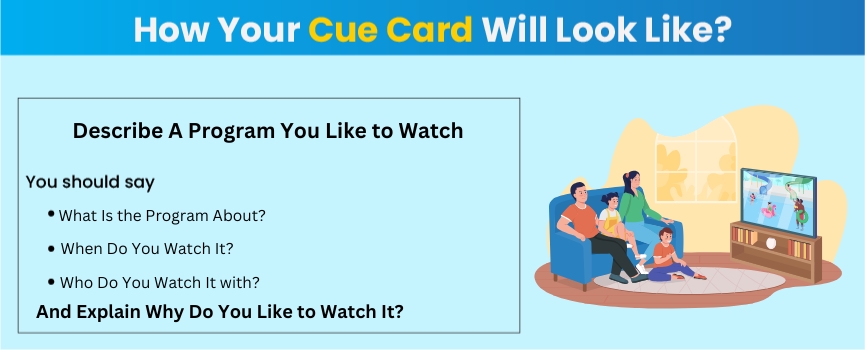Describe A Program You Like to Watch- IELTS Cue Card
Last updated: Nov 6, 2025Talking about a TV program sounds interesting, don’t you think? If we discuss this topic, surely you will enjoy because everyone has a different story based on their character, shows, and entertainment preferences. In the IELTS speaking test, you will receive a cue card which contains a random topic like this: “describe a program you like to watch”. Often, this part of the exam looks challenging for students because they have to quickly organize their thoughts and speak fluently for around one or two minutes. The best solution is to practice different topics and get mastery.

Table of Contents
Introduction to IELTS Cue Cards
The IELTS cue cards is a second part of the speaking section, which generally contains three to four questions and a topic. This part comes after the first, which is based on a general introduction. For this one, candidates get one minute for preparation and take notes on a card that includes the main topic and several bullet points to guide their talk.
The aim of this part of the IELTS speaking section is to test your fluency, coherence, vocabulary, and grammar. Additionally, in this part, the instructor checks how you organize your thoughts and ideas and use pronunciation clearly and accurately. Now that you know what the cue card is, let’s understand how to answer this.
How to Answer the Cue Card?
To answer the IELTS speaking part 2, first read the prompt and use the one-minute preparation time to jot down keywords for an introduction, main points, and a conclusion. During this time, structure the response logically, speak naturally and fluently, and support your ideas with specific examples and varied vocabulary. At the end, finish it with a brief conclusion to summarize your points. Know about it in detail.
- Preparation (1 Minute): Read the cue card carefully and make sure you understand all the prompts, including the tense (past, present, or future). Then think of the main example and jot down keywords or short phrases for 2-3 main points to discuss.
- Speaking (2 Minutes): Introduce the topic with a brief introductory sentence and develop your answer by discussing each of your planned points. Finish your speech with a short conclusion that summarizes your main points or provides a final thought on the topic.
Now that you understand, the IELTS speaking part 2 contains various topics for which you have to speak for a short time. If you want to make a good impression in front of the instructor, your practice must be good enough, and for that, the topic “describe a program you like to watch” can be a great one. Here are the questions related to the topic:-
- What Is the Program About?
- When Do You Watch It?
- Who Do You Watch It with?
- And Explain Why do you Like to Watch It?
Look at the image below. Your cue card in the speaking section will look like this:

After reviewing the topic, it is time to explore the sample answers. Let’s move ahead and find them.
Describe a Program You Like to Watch - Sample 1
Here is the first sample answer for the cue card topic- describe a program you like to watch, with proper structure including introduction, main body, and conclusion.
Introduction
There is a long-running Indian Hindi-language television program that I like to watch, and it’s also become one of the country’s popular and beloved shows. It is full of light-hearted comedy and positive social messages, and the name of the program is “Taarak Mehta Ka Ooltah Chashmah”.
What Is the Program About?
“Taarak Mehta Ka Ooltah Chashmah,” also known as TMKOC, which is a comedy serial, revolves around the residents of the fictional Gokuldham Co-operative Housing Society in Mumbai. In this serial, the primary focus is on the Gada family, particularly the central character, Jethalal Champaklal Gada, a quirky businessman, and his family: his wife Daya, son Tapu, and father Bapuji.
When Do You Watch It?
The episodes of Taarak Mehta Ka Ooltah Chashmah air from Monday to Saturday at 8:30 PM. Because of its immense popularity, reruns are frequently shown throughout the day on the Sony SAB channel and are also available for streaming on the SonyLIV platform. Its consistent availability makes it an easy show to catch up on whenever you have free time in the evening or a relaxing weekend afternoon.
Who Do You Watch It with?
One of the show's biggest strengths is its appeal to a wide demographic, making it ideal for family viewing. Its clean humor and relatable themes mean it can be enjoyed by children, teenagers, adults, and the elderly alike. Watching it with family members, friends, or even alone is common, as the relatable characters make you feel like they are an extended part of your own neighborhood.
Explain Why Do You Like to Watch It?
There are several reasons why I, and millions of others, enjoy watching TMKOC. It never contains vulgarity or offensive jokes, making it a safe watch for everyone. Also, the characters and their daily problems, from office issues to family misunderstandings and neighborly squabbles, are highly relatable to a typical Indian middle-class audience.
Conclusion
Taarak Mehta Ka Ooltah Chashmah is more than just a TV show; it's a cultural phenomenon in India that champions unity in diversity, family values, and the power of laughter. If you enjoy light-hearted, family-friendly comedy with a touch of social relevance, TMKOC is definitely an Indian TV program worth watching.

Describe a Program You Like to Watch - Sample 2
Here is another sample for the cue card - IELTS speaking part 2, a TV program.
Introduction
Shark Tank India is an Indian Hindi-language business reality television series that has become a cultural phenomenon, inspiring a new wave of entrepreneurship across the nation. Based on the internationally popular Shark Tank format, the show brings the high-stakes world of startups and investment to mainstream Indian audiences.
What Is the Program About?
The program provides a unique platform for aspiring Indian entrepreneurs to pitch their innovative business ideas or existing business models to a panel of successful, self-made multi-millionaire and billionaire investors, known as "Sharks". These Sharks evaluate the pitches, grill the founders on their business metrics, and decide whether to invest their own personal money in exchange for an equity stake in the company.
When Do You Watch It?
Shark Tank India typically airs new episodes from Monday to Friday, often in an 8 PM primetime slot. The seasons usually run for a couple of months. The show is available to watch on Sony Entertainment Television and for streaming exclusively on the SonyLIV app and website, allowing viewers to tune in live or catch up on episodes at their convenience.
Who Do You Watch It with?
The show's broad appeal makes it suitable for a diverse audience. It's an excellent program to watch with family members, from college students and budding entrepreneurs to seasoned professionals and homemakers, as it offers educational value and entertainment for all. The engaging content, which balances business strategy with personal stories and occasional emotional moments, sparks conversation and shared interest among viewers of different backgrounds.
Explain Why Do You Like to Watch It?
Shark Tank India is compelling because it is both educational and inspirational. Viewers gain a "crash course in entrepreneurship" and learn about business strategies, valuations, negotiation tactics, and market trends from seasoned experts. Also, it highlights the stories of everyday Indians from all backgrounds who dare to dream big, providing hope and motivation to those considering their own ventures.
Conclusion
Shark Tank India is a groundbreaking program that effectively combines the excitement of reality television with invaluable business insights. Its ability to bring the startup ecosystem into the mainstream has had a significant impact on the nation's entrepreneurial landscape. Whether you are interested in business, innovation, or simply enjoy watching passionate individuals pursue their dreams, this show offers a unique and highly rewarding viewing experience.

 Access speaking Mock Test
Access speaking Mock Test Describe a Program You Like to Watch - Sample 3
Read the last sample answer for the IELTS speaking section- cue card part.
Introduction
If you enjoy a blend of sketch comedy and celebrity talk shows, then "The Great Indian Kapil Show" is a fantastic program you would likely enjoy. Hosted by the charismatic comedian Kapil Sharma, this popular show has made a successful transition from television to the global streaming platform Netflix, reaching a wide audience in 192 countries.
What Is the Program About?
The Great Indian Kapil Sharma Show is a Hindi-language sketch comedy talk show. Each episode generally unfolds in two parts: the first features hilarious comic skits performed by a talented ensemble cast, including Sunil Grover, Kiku Sharda, and Krushna Abhishek, who play various quirky characters. The second part is a light-hearted interview segment where host Kapil Sharma engages in witty banter with celebrity guests from Bollywood, sports, business, and other fields. The current set is creatively modeled after an airport terminal, providing a fresh backdrop for the interactions.
When Do You Watch It?
The show is available on Netflix, with new episodes typically streaming every Saturday at 8 PM. The on-demand nature of the streaming platform means you can watch it at your convenience, making it a flexible option for any schedule.
Who Do You Watch It with?
The program is known for being family-friendly entertainment, making it an ideal show to watch with family members during the weekend. The broad appeal of its humor and celebrity guests means it can be enjoyed by people of all ages, from children to grandparents, creating a shared experience of laughter in the living room.
Explain Why Do You Like to Watch It?
There are a lot of reasons why I like to watch The Great Indian Kapil Show. The primary appeal is the guaranteed dose of laughter it provides, serving as an excellent way to unwind after a long and tiring day. Besides, the comedic timing and chemistry between Kapil Sharma and his co-stars are top-notch, with each character bringing their own unique flavor of humor to the stage. The show blends humor with relatable cultural references and everyday life jokes that resonate well with an Indian and global audience.
Conclusion
The Great Indian Kapil Show stands out as a delightful source of entertainment, offering a perfect mix of spontaneous humor, engaging celebrity conversations, and hilarious sketch comedy. Its ability to consistently deliver laughter and bring families together makes it a highly recommended program to watch for a cheerful break from daily life.


Lexical Resources
The examiner also identifies your ability to use vocabulary for IELTS in the speaking test, how you avoid repetition, and use relevant and accurate words. In the above sample answers, we have used some of the lexical resources to express different ideas. Here is the meaning of all of them.
| Lexical Resources | Meaning |
|---|---|
| Fictional | not real or true; only existing in stories, novels, etc. |
| Co-Operative | done by people working together |
| Quirky | unusual; especially in an interesting or appealing way |
| Immense | very big or great |
| Demographic | relating to the structure of populations and the different groups within them |
| Offensive | causing someone to feel resentful, upset, or annoyed |
| Phenomenon | a fact or situation that is observed to exist or happen, especially one whose cause or explanation is in question |
| Entrepreneurship | the activity of setting up a business or businesses, taking on financial risks in the hope of profit |
| Occasional | happening sometimes, but not regularly or often |
| Compelling | not able to be refuted; inspiring conviction |
| Negotiation | discussion aimed at reaching an agreement |
| Groundbreaking | original and important; showing a new way of doing or thinking about things |
| Significant | sufficiently great or important to be worthy of attention; noteworthy |
| Charismatic | one that is attractive, influential, and inspiring to others due to special personal qualities |
| Resonate | something is personally significant, evoking a strong emotional or intellectual response because it connects deeply with your own experiences |
| Delightful | Anything delightful causes pleasure or joy |
| Spontaneous | performed or occurring as a result of a sudden impulse or inclination and without premeditation or external stimulus |
| Hilarious | extremely funny and causing a lot of laughter |

Follow-Up Questions
Part 3 in the IELTS speaking section is based on follow-up questions and conducted for around 4 to 5 minutes. The examiner can ask you some questions regarding the cue card and what you spoke about in part 2. Here are some examples with their answers.
1. What Types of Programs Do Indian People Like to Watch?
Indian people usually watch reality shows, daily soaps (dramas), and news channels. They also like cricket matches; there is a massive audience for sports, including me. While older generations might prefer traditional TV, the younger generation increasingly enjoys streaming platforms with diverse content like web series and international shows.
2. Do You Think Children Can Learn from Watching TV Shows?
Absolutely, I do. There are many educational shows, like documentaries on Discovery, National Geographic, History TV, and Animal Planet, that teach children in an engaging, audiovisual manner, which is often more effective than reading alone.
3. Do You Like Watching Foreign TV Shows?
Yes, I do. I enjoy watching foreign TV shows because they offer a unique glimpse into different cultures and lifestyles around the world. Many shows have exceptional production quality, captivating storylines, and advanced special effects, which I like the most.
4. Has Television Changed Much in the Last Few Decades in Your Country?
Yes, immensely. Decades ago, we had only a few national channels and limited programming on TVs. Now, the rise of cable TV, and more recently, the internet and streaming services like Hotstar and Amazon Prime, has completely transformed the landscape.
5. What Types of TV Programs Are Most Popular in Your Country?
In my country, a wide range of programs are popular, including reality shows like Big Boss, cricket matches, Kaun Banega Crorepati, Satyamev Jayate, etc. In recent years, we have seen a series of streaming platforms, covering genres from comedy-drama to crime thrillers, that have also become very popular, especially among the youth.
Tips to Excel in IELTS Cue Card
You can join offline or online IELTS classes and get taught by professionals who are excellent in their fields. Apart from this, here are some tips that you can follow to excel in the cue card part.
- Elaborate your points with personal experiences and specific details to make your answer more interesting and to show your language ability.
- Include synonyms and a mix of simple and complex sentences to demonstrate a wide range of language skills.
- Look at the examiner to stay engaged. Speaking with confidence and even natural hand gestures can enhance your performance.
- Aim to speak for the full two minutes. If you run out of things to say, you can expand on a point you have already made, but do not rush or speak too quickly.
Master the IELTS exam with our Prep Boost
What’s included:
- Pre-recorded video lectures
- Advance Study Materials
- Detailed Feedback Report
Conclusion
Practicing with the sample cue card can help you enhance your English speaking skills; with this blog, you might have understood it. This is not just about the exam; it’s about your career, which you are going to begin in another country. If you want to be a comfortable person among those, “Describe a Program You Like to Watch” and place, person, or thing can be a great example. Not just speaking, you should also be ready for rest areas like reading, writing, and listening sections. You can take regular mocks and evaluate your abilities through the IELTS band score calculator and estimate your current performance.
0 comments

Practice Makes a Man Perfect!Take FREE ielts Mock Tests
Start FREE Mock TestPredict your IELTS Band

98% students got exact IELTS Band
What is your Target IELTS Band?
Get familiar with the Real IELTS Exam for Free!
Start Free Mock TestWe are available in :
BangaloreAhmedabadJaipurHyderabadKeralaPuneChandigarhMumbaiGurgaonChennaiKolkataTrivandrumNoidaKochiCalicutKottayamKollamThrissurIndoreUdaipurdisclaimer:logos and other registered trademarks of universities used on this platform are held by their respective owners. Gradding does not claim ownership or association on them, and their use is purely for informational and illustrative purposes.











